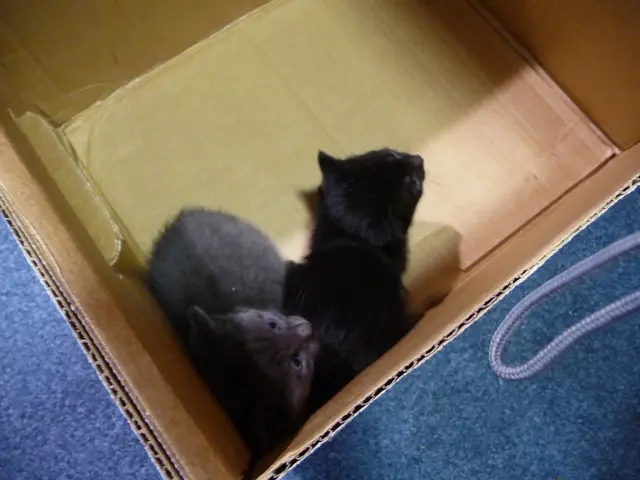Unraveling the Mystery of Feline Zoomies: Causes and Explanations
Cat zoomies, also known as frapping, are those random bursts of energy where your feline friend darts around the house like they've had a few espresso shots. And while it's typically harmless and downright adorable to watch, it can sometimes signal a problem that needs addressing.
Curious about what's going on and how to keep your cat safe? Let's explore the world of cat zoomies and uncover the answers to your burning questions.
Understanding Cat Zoomies
So, what on earth is causing these zoomie sprees? Well, the honest truth is that our domesticated kitties are still hunters at heart – they just don't have the opportunity to hunt as much as their outdoor counterparts.
Indoor cats are forced to deal with everyday life sans the thrill of the chase and catch. This lack of satisfaction for their natural predatory instincts often leads to those speedy sprints and zoomies around your home.
Interestingly, age can also play a role in the occurrence of cat zoomies. While older cats may still get them from time to time, it's usually more common amongst kittens and younger felines.
Dusk, Dawn, and those Night-Time Zoomies
Have you ever noticed that your beloved cat seems to go wild at certain times of the day? It turns out that these little furballs are crepuscular, which means they're most active during the twilight hours of dawn and dusk. This is when their natural prey are at their most active too, so it makes sense that your cat would be as well.
As for why your cat might be zooming around the house at odd hours like the middle of the night, it could simply be because they're adjusting their sleep patterns based on your schedule.
After Using the Litter Box or Pooping
Ever noticed that your cat's behavior changes drastically after a bathroom break? If so, you're not alone. After using the litter box or passing stool, cats often exhibit what's called the "post-defecation zoomies."
While it might just be simple relief causing them to get up and move about, it could also be a sign of a digestive issue, such as constipation, going outside the litter box, or a problem with their urinary tract.
If you notice your cat exhibiting any of these symptoms, be sure to contact your vet to rule out any potential health issues.
Are Cat Zoomies Normal?
Short bouts of frenetic activity, lasting for five or ten minutes, once or twice a day, are generally no cause for alarm. But like any normal cat behavior, if you notice excessive zoomies, it could indicate that something is off and your cat is experiencing feelings of distress.
If you see your cat excessively scratching or licking after the zoomies, it's best to get them to the vet as soon as possible. These behaviors, together with the zoomies, could be signs of pain or a medical issue.
Moreover, if your cat is acting strangely or losing weight inexplicably, it could be a sign of hyperthyroidism. With middle-aged cats, this condition is quite common. And if you suspect cognitive dysfunction in older cats, constant staring, disorientation, and sudden bolting around the room are signs that it's time to visit the vet.
Lastly, it's crucial to remember that providing enriching and safe environments for our kitties can significantly minimize excessive zoomies and dangerous behaviors. A well-stimulated cat is a happy and healthy cat.
Keeping Your Cat Safe During Zoomies
While most cats are safe during their zoomie sprees, there is still potential for injuries to occur, especially on smooth or carpeted surfaces. Make sure to secure small rugs and other slippery objects to prevent accidents.
Be mindful of leaving bags, strings, or any small objects within reach during their playtime. Raisins, grapes, sugar-free gums, candies, and prescription pills need to be kept out of your cat's paws, as they can all pose significant health risks.
How to Stop Cat Zoomies
To stop those frustrating, late-night cat zoomies, try offering your cat more exercise and playtime during the day. Engaging in regular, interactive play sessions using toys that mimic prey, such as feather wands or laser pointers, can help satisfy their natural hunting instincts and reduce any excess energy built-up within your kitty.
Offering puzzle feeders, scratching posts, and climbing trees can help keep your cat mentally and physically stimulated throughout the day, reducing the chance of boredom that might lead to the zoomies.
It's essential to strike a balance between allowing your cat to release their energy and keeping them safe within your home. Happy playtime, friends!
During cat zoomie sprees, a cat's behavior can be linked to their natural predatory instincts that aren't fully satisfied due to lack of hunting opportunities. For this reason, understanding that indoor cats are still hunters at heart can help pet owners provide a healthier lifestyle and safe environment for their cats. This includes offering interactive toys, puzzle feeders, scratching posts, and climbing trees to keep cats mentally and physically stimulated, thus reducing the chances of excessive energy build-up leading to zoomies.








